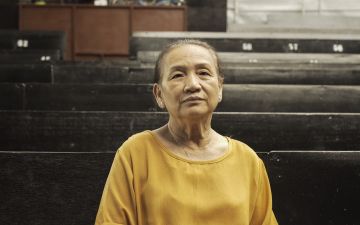Cambodia is a country choked by narratives of trauma. It has been stated that roughly 40 percent of Cambodians suffer from mental health issues, largely attributed to the genocide perpetuated by the Khmer Rouge Regime. The country has 35 trained psychiatrists and two psychiatric inpatient units to service approximately 15 million people. Against the backdrop of this “appalling mental health crisis” is a new variable in the trauma dialectic: a growing awareness in the health community of a nascent field of science, epigenetics. Mounting evidence suggests the experience of adversity is carried in one’s cells and can be passed to future generations. The biological intergenerational transmittance of trauma, specifically, has been written about in the popular press, its implications far-reaching. Social scientists examining distal impacts of this research caution that uptake of preliminary research may unintentionally perpetuate narratives of permanent damage rather than promoting a discussion of resilience/neurobiological adaptability.
Psychosocial intervention has become an essential component of international humanitarian responses, and Euro-American psychiatry conceptualizes mental health in increasingly biological terms. Anthropologists have documented when disconnects between local and external approaches have disrupted communities’ coping strategies that give meaning to suffering. What are local ways of understanding trauma and resilience, and what efforts have been made to harness this expertise? Chhim Sotheara, a Cambodian psychiatrist and Executive Director of the Transcultural Psychosocial Organization (TPO), the primary psychosocial NGO in the country has published on the notion of “baksbat”, the concept in Khmer he believes represents the Cambodian-specific version of PTSD, translated in English as “broken body,” “broken form,” “broken courage.” How do individuals relate to this term and how do they conceptualize therapeutics around this notion?
The first published output of this ongoing collaborative work with partners in Cambodia is a multimedia story centered around the narrative of one woman, Voan Savay, the former prima ballerina of the Khmer Royal Ballet of Cambodia before Phnom Penh was taken by the Khmer Rouge regime in 1975. Voan survived the regime (during which 90 percent of artists were assassinated) and has now returned to Phnom Penh after decades abroad. She feels her duty is to pass her embodied knowledge of the ancient Apsara dance to the next generation. Voan’s story is juxtaposed with Dr. Chhim Sotheara’s discussion of “baksbat.” Voan Savay is determined and hopeful: “When you believe you have “baksbat” you cannot do anything anymore. I want to do something. I want to walk forward, and that is my responsibility.” This is a story that spotlights the healing power of art and forefronts a survivor’s account of leadership and resilience. Internationally recognized Cambodian artist Svay Sareth expressed, “We need to create heroes instead of ‘baksbat’ stories,” and this sentiment fuels this work. This first piece is a reflection on arts as healing and on the transmission of embodied cultural knowledge.
This reporting takes a solutions journalism approach, focusing on therapeutic efforts from different spheres. The hope is to foster discussion around transnational flows of scientific knowledge, as well as challenge assumptions about the dominance of psychiatry as the preeminent solution, highlighting local frameworks and forms of expertise.

